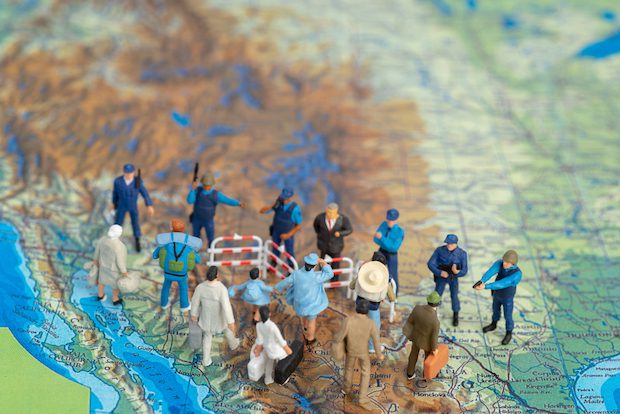NYT: Yep, There’s A Border Emergency

Yesterday I wrote about the Washington Post’s report on the emergency situation at the US-Mexico border. Lo and behold, tonight The New York Times does the same thing. Excerpts:
The number of migrant families crossing the southwest border has once again broken records, with unauthorized entries nearly doubling what they were a year ago, suggesting that the Trump administration’s aggressive policies have not discouraged new migration to the United States.
More than 76,000 migrants crossed the border without authorization in February, an 11-year high and a strong sign that stepped-up prosecutions, new controls on asylum and harsher detention policies have not reversed what remains a powerful lure for thousands of families fleeing violence and poverty.
“The system is well beyond capacity, and remains at the breaking point,” Kevin K. McAleenan, commissioner of Customs and Border Protection, told reporters in announcing the new data on Tuesday.
The nation’s top border enforcement officer painted a picture of processing centers filled to capacity, border agents struggling to meet medical needs and thousands of exhausted members of migrant families crammed into a detention system that was not built to house them — all while newcomers continue to arrive, sometimes by the busload, at the rate of 2,200 a day.
“This is clearly both a border security and a humanitarian crisis,” Mr. McAleenan said.
Read the whole thing. You really should. The story points out three interesting and highly relevant facts:
1) As high as these numbers are, they are nowhere near as high as they were 20 years ago; and
2) this current crisis is not the kind that can be solved by building a wall; most of these people aren’t trying to sneak across the border, but are turning themselves in to US officials and asking for asylum, in accordance with current law; and
3) these aren’t primarily single men looking for work, but entire families, with children, which makes dealing with their cases a lot more complicated
The Times lede tweaks Trump for his failed border security policies, but if he got tougher with these migrants, the Times would slap him for being a heartless monster. What does the paper want from him? Mind you, this is a news story, not an editorial, but you can see the moral and political dilemma here.
In 2015, with migrants pouring into Europe from the Middle East, I suggested in this space that readers subject themselves to the 1970s dystopian novel The Camp Of The Saints. I said that it is a “bad book,” both morally and aesthetically, and I stand by that judgment. It is frankly racist in parts, and you want to take a shower after finishing it. But the book is worth reading because it tells an important political story — one that has become far more urgent since the novel first appeared.
The book is about how a future France prepares for a vast armada of over a million desperately poor Third World migrants headed for France’s southern coast. Either France allows them to land, and by so doing surrenders their country, or they save their country by refusing the wretched of the earth, and having to live with the shame of so doing. The book is not really about the poor, but about the hearts and minds of the French elites. What we see is an elite that is so filled with self-hatred and historic guilt that it opens the borders, seeking redemption through surrender to the Third World.
The situation at the US-Mexico border is rather different from the fictional one in the French dystopic novel, obviously, but the moral and political question is pretty much the same thing. The Times story says this surge is because smugglers have spread the word throughout violent, impoverished Central America that families stand a better chance of getting into the US. Do we open the borders to these people, and accept the political consequences (or de facto accept them by refusing to think about them)? Or do we turn them away, and send them back to suffer?
If you say “let them in,” at what point do you decide no more? How will we know when we have taken in the last Central American family, and will have to tell all the rest they cannot come in? Who are we as a country?
This is not an abstract problem. Nor is it a problem that Donald Trump created. In fact, in one sense, this problem created Donald Trump.